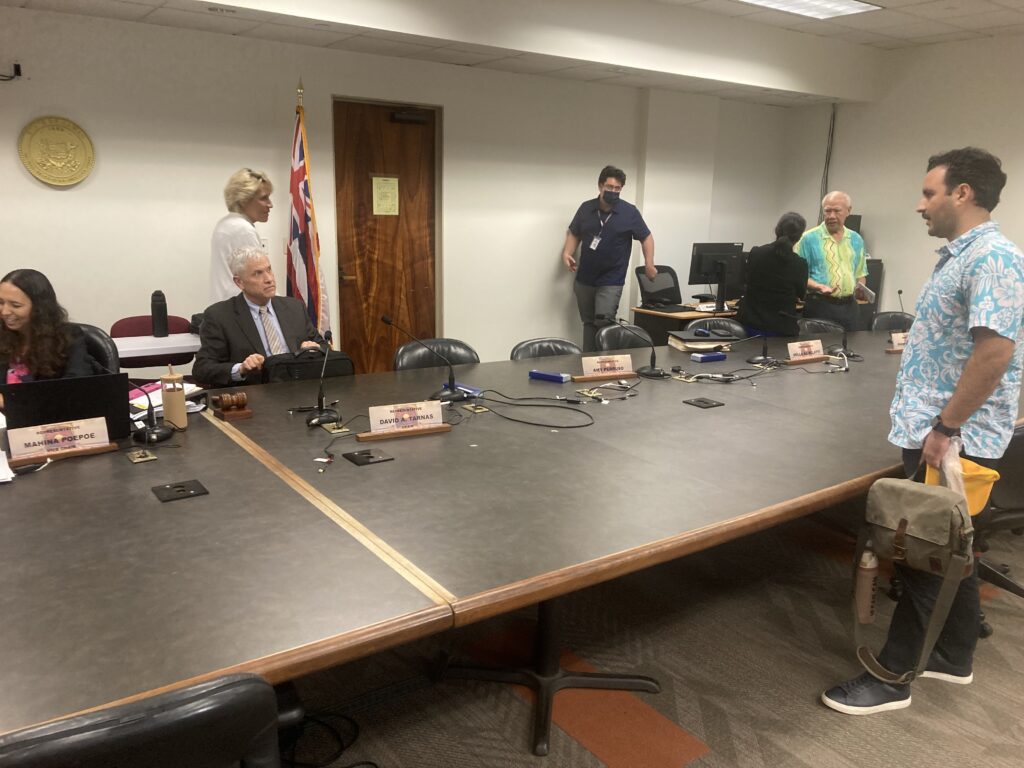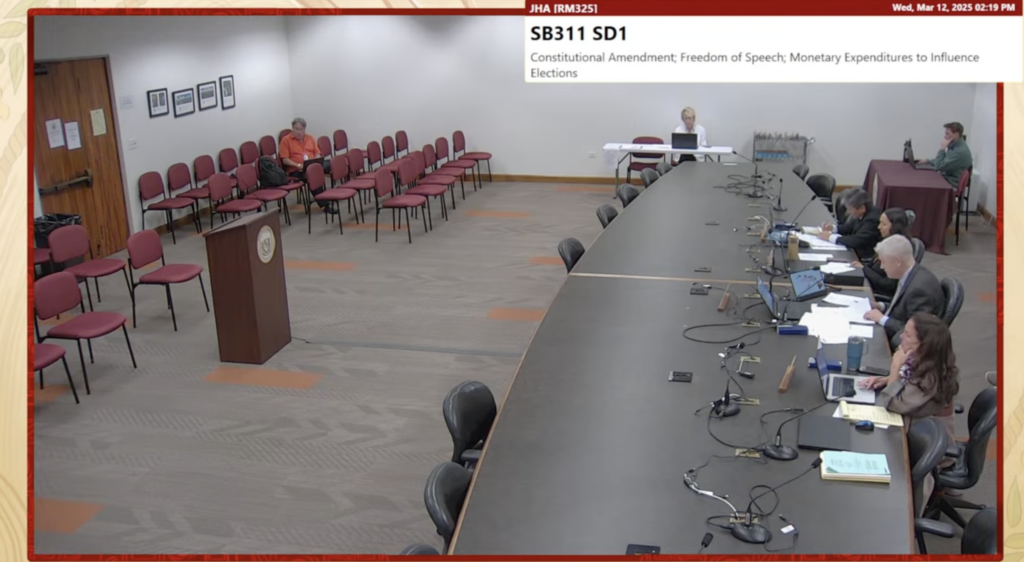The Sunshine Blog: Not Enough Money To Get Money Out Of Politics?
Short takes, outtakes, our takes and other stuff you should know about public information, government accountability and ethical leadership in Hawai‘i.
March 16, 2025 · 10 min read

About the Author
Short takes, outtakes, our takes and other stuff you should know about public information, government accountability and ethical leadership in Hawai‘i.
Cash withdrawal: Taxpayer money for new initiatives is going to be tight this year, or at least that’s what everyone thinks given the Trump administration’s sweeping threats to cut federal funds. So perhaps it’s surprising that a plan to put more money toward public financing of political campaigns is still limping along at all in the Legislature.
House Judiciary Chair David Tarnas is one of those seeing the writing on the wall and last week made it clear comprehensive public financing of campaigns for anyone who agrees not to take private donations is just not happening. Tarnas killed Senate Bill 51, but he was much more enthusiastic about a plan to put more money into the state’s existing program that partially pays for campaigns. The problem has been the money just hasn’t been enough to attract solid candidates willing to forgo private donations.
“Let’s see if we can take this all the way to the finish line,” Tarnas told the handful of advocates who showed up to testify at the hearing. (Lot of written testimony though.)
After deferring SB 51 Tarnas replaced the partial public financing measure, Senate Bill 345, with the House’s version of the bill, House Bill 370, which crossed over to the Senate where it is awaiting a hearing.
That caused a bit of a dustup after the hearing with Evan Weber, who’s spearheading the Clean Elections Hawaiʻi Coalition and is a major advocate for full financing. He confronted Tarnas and accused him of using a gut-and-replace maneuver on the partial funding bill.
“I’d like to get that first,” Tarnas said during the hearing about beefing up partial public financing, which is now headed to House Finance and then presumably to conference committee, the place Tarnas said it needs to be.

Rep. Della Au Belatti, who also seemed a bit surprised at the way things were going, spoke about how she has been advocating for public financing and campaign reform for 28 years. She believes comprehensive financing could be “the kind of reform that is innovative and truly transformative.” Even if it knocks her out of her own seat, she said.
Camron Hurt of Common Cause Hawaiʻi, one of the few testifiers present in the room for the hearing, told The Blog later that he was bummed that the full funding bill died once again.
“And I think what is most concerning is that advocates gave four different ways to address campaign financing in a meaningful way, and they have chosen the least meaningful way to attempt to address it,” he said after the vote.
Hurt added that the decision to kill the bill appeared to have been made before the hearing, something he would like to know more about.
“I think that’s the question that we as advocates, professional advocates, would like to know,” he said.
Weber was more jaded in his view about the demise of full financing.
“You know, the Council on Revenues (forecast) and the Trump cuts and everything like that, that’s just the latest twist on their same favorite talking point, which is that we don’t have enough money to get money out of politics,” he told The Blog.
The Legislature, he added, has decided that “democracy is not a priority, despite the fact that the Foley commission says you should do this, despite the fact that it’s in the state Constitution to really invest in public campaign funding.”
The 442nd wins again: Now that’s impact.
One day after Civil Beat columnist Denby Fawcett and others wrote about the Army purging a web page from its website that honored the 442nd Regimental Combat Team, the page was not only back on the site but featured on its homepage.
The 442nd web page apparently fell victim to President Donald Trump’s campaign against any mention on government sites of diversity, equality and inclusion. That prompted Secretary of Defense Pete Hegseth to proclaim, “DEI is dead.”
But the famed 442nd, a unit comprised of Japanese-American soldiers — many of them from Hawaiʻi and mainland internment camps — overcame far tougher obstacles while marching through Europe under intense enemy fire during World War II.

Fawcett’s column clearly struck a chord. As of Saturday afternoon Civil Beat had published 74 comments in response, most of them from readers outraged by the Army’s action.
But the web page is back, complete with this pithy wording that no doubt drew the attention of the unfortunate people trying to follow the orders of their new commander in chief: “They fought two wars: the Germans in Europe and prejudice in America.”
Which leaves The Blog wondering, is there worse duty right now than working in public relations for the U.S. military?
On the other hand, at least the DEI-purgers still have jobs.
Do you know where your campaign contribution is tonight?: When people donate to a political candidate, they probably expect the candidate to spend it on his or her own campaign.
In reality, that’s often not the case. Every election cycle, hundreds of thousands of dollars in campaign donations get re-gifted to other candidates, or to charities or schools.
It’s a form of alliance-building that good-government groups such as the League of Women Voters would like to see stopped, but that legislators are reluctant to give up.
The latest example is House Bill 772, which would have ended the candidate-to-candidate giving that’s currently allowed when one politician uses campaign funds to purchase up to two tickets to another politician’s fundraiser.
Those ticket-buying “contributions” can total up to $2,000 for House candidates, $4,000 for Senate candidates and $6,000 for statewide candidates.
A total of $386,038 changed hands this way during the 2024 election period, according to the Campaign Spending Commission.

Government reformists have been trying to eliminate this practice for years. And this year the bill died again, without a hearing in the House Finance Committee.
And, little wonder, the powerful chair of that committee, Rep. Kyle Yamashita, is a frequent user of this ticket-buying method of sharing the wealth.
During the 2022 and 2024 election cycles, Yamashita’s campaign committee contributed $46,250 through ticket purchases to 22 other candidates, according to the Hooser Blog produced by former legislator and Kauaʻi County Council member Gary Hooser.
From one blog to another, Hooser’s frequent posts are some of the most colorful calls for reform in Hawaiʻi politics that you’ll read anywhere.
“HB 772 was referred to House Finance by Speaker Nadine Nakamura even though it has no impact on the state budget whatsoever – zero, zip, nada,” Hooser blogged.
Two years ago, the Commission to Improve Standards of Conduct — created after two legislators were convicted of bribery — proposed ending the practice of candidates re-gifting campaign funds.
That measure got amended to the point where it actually would have made it easier for politicians to contribute some of their campaign funds to other candidates by eliminating the need to do so through ticket-buying. Fortunately the radically altered bill then died.
Leave bad enough alone, eh?
Divided we stand: Hawaiʻi’s U.S. senators split their votes on the government funding bill Friday, a vote that has Republicans crowing and Democrats fighting among themselves and some calling for leadership changes.
Sen. Brian Schatz was one of only 10 Democrats to back the continuing resolution measure, which keeps the federal government funded for six more months.
“Today’s vote on the continuing resolution was a difficult and close call, but ultimately, I made the determination that a flawed bill was better than no bill at all,” Schatz said in an emailed statement. “A shutdown would enable Donald Trump and Elon Musk to unilaterally determine that the vast majority of federal workers are not essential. And given the number of federal workers in Hawai‘i, mass furloughs would be deeply painful for people across the state.”

Sen. Mazie Hirono was her usual take-no-prisoners self.
“By forcing a choice between a deeply partisan CR that removes critical guardrails and a shutdown that would enable Trump and Musk to sow yet more chaos, Republicans have made clear that they are more concerned with pleasing Donald Trump than protecting the American people,” Hirono said in her post-vote statement. “It didn’t have to be this way — Republicans and Democrats were close to a bipartisan agreement that would have kept government open with full Appropriations bills. Republicans chose to walk away from those negotiations at the 11th hour.”
In the House of Representatives, both U.S. Reps. Ed Case and Jill Tokuda voted against the CR. Only one House Democrat voted in favor.
Do the math: To help taxpayers figure out how much they may save because of the historic tax cut approved by the Hawaiʻi Legislature last year, the state has launched TaxCutHawaii.org, an online resource that helps folks calculate their estimated tax savings through 2031.
The website features:
- a tax rate calculator to help people estimate their tax reductions and take-home income;
- a FAQ section for taxpayers and businesses about the tax cut, changes to withholding amounts and potential savings; and
- educational resources on the new Hawai‘i tax brackets and what it means for financial planning
While all taxpayers are expected to see savings, the biggest relief will go to households earning $150,000 or less, according to a press release Thursday about the website: “For example, a family of four making $88,000 a year will save about $20,000 in state taxes over the next five years.”
A complete unknown: Bills on gun regulations and fireworks drew a crowd of testifiers Thursday at a House Judiciary and Hawaiian Affairs Committee hearing.
A captive audience, one might say, for Hawaiʻi Libertarian Party Chair Austin Martin, who opposed most of the measures and capped off his testimony on a fireworks bill with a song.
Tarnas, the committee chair, allowed a couple minutes then stepped in with perfect timing to ask “Can you summarize?” which led Martin to switch to the chorus for a few seconds before they cut his YouTube feed.
 Sign up for our FREE morning newsletter and face each day more informed.
Sign up for our FREE morning newsletter and face each day more informed.
Read this next:
A Talk With The Hawaiʻi Hotel Alliance About An Uncertain Time For Tourism
By Chad Blair · March 17, 2025 · 27 min read
Local reporting when you need it most
Support timely, accurate, independent journalism.
Honolulu Civil Beat is a nonprofit organization, and your donation helps us produce local reporting that serves all of Hawaii.
ContributeAbout the Author
The Sunshine Blog is reported and written by Ideas Editor Patti Epler, Deputy Ideas Editor Richard Wiens and Politics Editor Chad Blair.
Latest Comments (0)
If only they were as creative solving actual problems as they are coming up with new ways to tax us.
Revell · 4 months ago
We actually donât need to spend any money to solve this problem. Make it illegal to donate over a nominal amount of money and make all donations have to be anonymous.
Kai808 · 4 months ago
The presumption that a wave of public umbrage is what moved the Army to re-post the 442nd's info on its website is belied by the Army's own statement about the removal: we're working on it and will be reposting after review. The entire enterprise of 'equity' and 'inclusion' has fostered an atmosphere of too-easy-outrage that does not serve us well. Yes, righteous indignation is a pleasant feeling, but no, it's not always the best first-reaction to some news. Keep calm and carry on!
Haleiwa_Dad · 4 months ago
About IDEAS
Ideas is the place you'll find essays, analysis and opinion on public affairs in Hawaiʻi. We want to showcase smart ideas about the future of Hawaiʻi, from the state's sharpest thinkers, to stretch our collective thinking about a problem or an issue. Email news@civilbeat.org to submit an idea.


